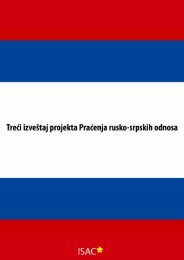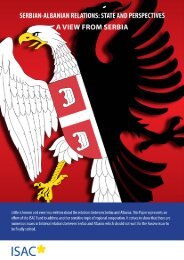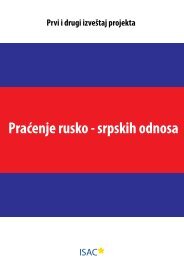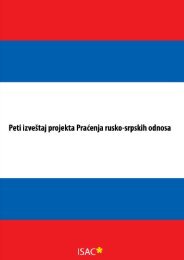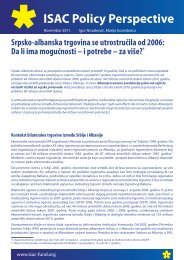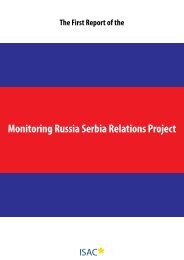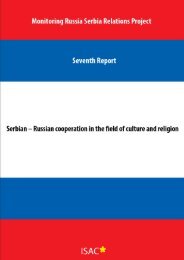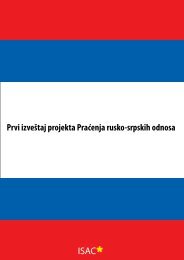MONITORING RUSSIA SERBIA RELATIONS - ISAC Fund
MONITORING RUSSIA SERBIA RELATIONS - ISAC Fund
MONITORING RUSSIA SERBIA RELATIONS - ISAC Fund
- No tags were found...
Create successful ePaper yourself
Turn your PDF publications into a flip-book with our unique Google optimized e-Paper software.
place in the post-cold war world), while, during the "Yugoslav heritage wars", Milosevic'sSerbia often turned to "matuska Russia", expecting help – or rather, expecting that theconfrontation between Russia and the West will resume and that the FRY will reoccupy its"comfortable" position between the two opposing blocs. In those years, Russia tried to takepart in making decisions on war issues in former Yugoslavia, but its engagement and powerfailed to satisfy the unrealistic ambitions of the Serbian political leadership (who were, bythe way, too often tied with marginal persons from the Russian politics and even helpedthem financially, hoping they will come to power), which constantly led to newdisappointments (especially during and after the NATO bombing of Serbia in 1999).The political changes in Serbia of 5 October 2000 resulted in changes in mutual relations aswell. Owing, to a large extent, to Milosevic's unrealistic expectations from Russia and partlyto the Russian decision to "withdraw" from the Balkans, the relations cooled down abruptlyin the first years of the 21 st century (to such an extent that in June 2001, FRY PresidentKostunica made a diplomatic gaffe – instead of welcoming Russian President Putin at theairport during his first visit to Serbia after the changes of October 2000, he waited for him inthe federal government building).* * *Ever since the beginning of the 18 th century, the general perception of Russia in theseregions has largely depended on mutual political relations. Before that time, in the periodfrom the 15 th to the 18 th century, the prevailing perception of Russia among the Serbsamounted to a basically religious idea of Moscow as the Third Rome (the elements of whichwere recognizable in subsequent times as well). After the Viennese War, the address ofSerbian dignitaries to Tzar Peter the Great and the migrations of Serbs to Russia, theprevailing idea among the Serbs in the 18 th century was that a of a "great Orthodoxemperor", who was a protector of the Serbs, whereas Serbian travellers looked upon Russiaas their "third homeland", owing to a large number of Serbs that had moved there.The 19 th century brought an image of Russia as the leader of awakened Slavism. In thatperiod as well, though, there were some reserved and even skeptical stances when Russiawas at issue. 25 However, the political turning-point of 1878 saw the first traces ofRussophobia in the Serbian society. The next, 20 th century, highly ideologized due to theCommunist victory in Russia, brought two extremities – ideologically close Serbiancommunists saw in Russia the leader of those who were humiliated and deprived of theirrights, while its opponents considered it a sanguinary Communist form of despotism.The turning-point in 1948 introduced an important novelty in the perception of Russia(USSR). As of that time, local communists waged a never-ending battle against Soviet oneson the following issue: who of them was the true interpreter and successor to Marx andLenin. That "battle", which was vividly described by M.S.Gorbachev after his meeting withMilosevic, when he said that Milosevic had been arguing with him for two hours about theway he should be leading Russia, turned into an irrational and arrogant manner of belief thatpoliticians and intellectuals here were "used" to "conduct" the Russian policy 26 instead of25 Cf. Jakov Ignjatovic, Russian Chauvinism among the Serbs, J. Ignjatovic: Publicist Writings, Book 2, NoviSad, Pristina 1989, 67-8226 "The Serbs are persistently putting up resistance and defending their homeland. And Russia is sleeping. Weare defending Russia as well, trying to awake it at the same time" (Vojislav Seselj, "The Serbian People andNew World Order", New World Order (http://www.antiglobalizam.com/?lang=cyr&str=nsp)). It will beunrealistic if Russia should continue pursuing a course of a repressed historical and traditional consciousness,if it should continue walking along the line of a "diplomatic equidistance" and keep mistaking things for oneanother in the field of the former Yugoslavia. Therefore the Serbs are still criticized today with indignation,while "Croatian heroes under Stalingrad" are still being used against the Serbs, the way Tito did. (…) Hence50



